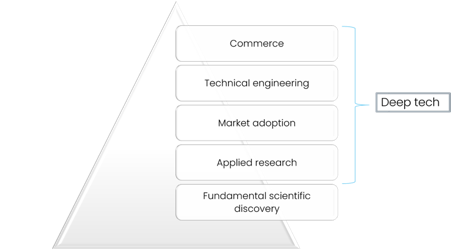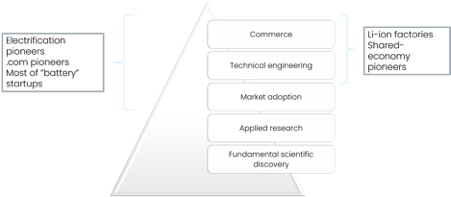Deep tech – is it for you?
Deep tech is a well-known term and sounds fancy, but what is deep tech? How to differentiate deep tech from just any technology, and who needs deep tech anyhow?
What is deep tech?
According to Wikipedia, “Deep tech, or deep technology startup companies, are companies with the objective to provide technology based on substantial scientific advances and high-tech engineering innovation. They require lengthy research and development, may take a long time to reach commercial application, and often require large investments to achieve commercial success. The underlying intellectual property of deep tech innovations is usually well-protected and hard to reproduce, making it a strong competitive advantage or barrier to entry.” Let’s see step by step what lies behind any product or solution, and what differentiates deep tech technology.

Fundamental scientific discovery is the cornerstone of it all. Someone comes up with a brilliant invention new to humankind, and the journey begins. However, this is only the beginning. Plenty of applied research is needed to understand the exact behavior of the discovery and to make it practically useful.
After the discovery’s character is well understood, it is time for market adoption. How can you use what has been discovered? How is the discovery harnessed into real life applications?
Technical engineering refines the discovery even further. At this stage, the innovation is qualified to meet the standards and market requirements to become a product.
The last, but not least, step is to commercialize your discovery – now a product: turn it into a solution, and to make your customers adopt it. In many cases, this can even be the most demanding phase – the world is full of novelties and convincing your customers, and finding investors is not a simple task. The more complex the solution and the new business model, the more time this phase requires and more risks it bears.
“Deep tech” involves solving problems at all these levels, and it goes all the way down to applied research.
We would argue that “deep tech” involves solving problems at all these levels, and it goes all the way down to applied research. Let us take an example of a new battery invention. The fundamental scientific discovery of the electro-chemical technology behind batteries was made in the 1750s by Benjamin Franklin and Alessandro Volta. With applied research, the reaction was better understood, and mankind learned to control it. Further research led to more scientific discoveries of electrochemical reactions which, after further applied research, have established different classes of batteries. With market adoption, we found specific applications for these various types of batteries, engineers have managed to build products using them, and commercialization brought them to our everyday life. However, not every company involved in this value chain can be classified as a deep-tech one. A project for setting up another li-ion battery gigafactory applies relatively well-known technology, and the use cases are well-known. In this case, the project falls only to the boxes of technical engineering and commerce.
A startup designing li-ion-based innovative products is not deep tech either – its business is in finding new markets for a relatively novel, already proven technology, engineering relevant products, and finding business models to sell them to customers. Most of the battery startups nowadays are in this category.
Deep tech unleashes a significant potential for growth and returns – oftentimes creating the Blue Ocean, setting up whole new industries and consumption models.
There is another, much smaller cohort of battery startups that are engaged in applied research to introduce novel disruptive electrochemical processes and components. These companies must go up through all the levels of market adoption, engineering and commercialization, but they hold the keys to the creation of products that definitely stand out of the competition.

Deep tech – why bother?
Deep tech involves more risks and requires more money than just a technological innovation. The business models are often complex. On the other hand, deep tech unleashes a significant potential for growth and returns – oftentimes creating the Blue Ocean, setting up whole new industries and consumption models. At its best and with a bit of luck, only sky’s the limit to a brilliant deep tech solution.
Deep tech advances humanity and allows us to take the next step higher. There is no need to look for reasons to go for deep tech – deep tech itself is the reason.
Deep tech has a security aspect. The barriers to challenge one’s position in the deep tech market are often high, which gives deep tech pioneers a strong, lasting competitive advantage.
Deep tech represents fundamental ways of solving essential problems, and often these ways are new and unforeseen. They may go down to a new technology or a new way of living and even require resetting of our mindsets. But after all, deep tech drives us forward as humans. It feeds our hunger to learn and to achieve more. Deep tech advances humanity and allows us to take the next step higher. There is no need to look for reasons to go for deep tech – deep tech itself is the reason.
Andrey Shigaev is the CEO of Geyser Batteries. At SHIFT 2020, he discussed how and if science is leading the way for sustainable business.




Sisällön yhteydessä voidaan näyttää sosiaalisessa mediassa julkaistuja sisältöjä. Sosiaalisen median palvelut (esim. Facebook, Instagram, X ja YouTube) voivat hyödyntää evästeillä kerättyjä tietoja omassa käytössään. Näitä kohteita käytetään sinulle ja sinun etuihisi liittyvän mainonnan toimittamiseen. Lisäksi näitä evästeitä voidaan käyttää mittaamaan mainoskampanjoiden tehokkuutta. Mainosverkostot sijoittavat ne yleensä verkkosivuston ylläpitäjän luvalla.